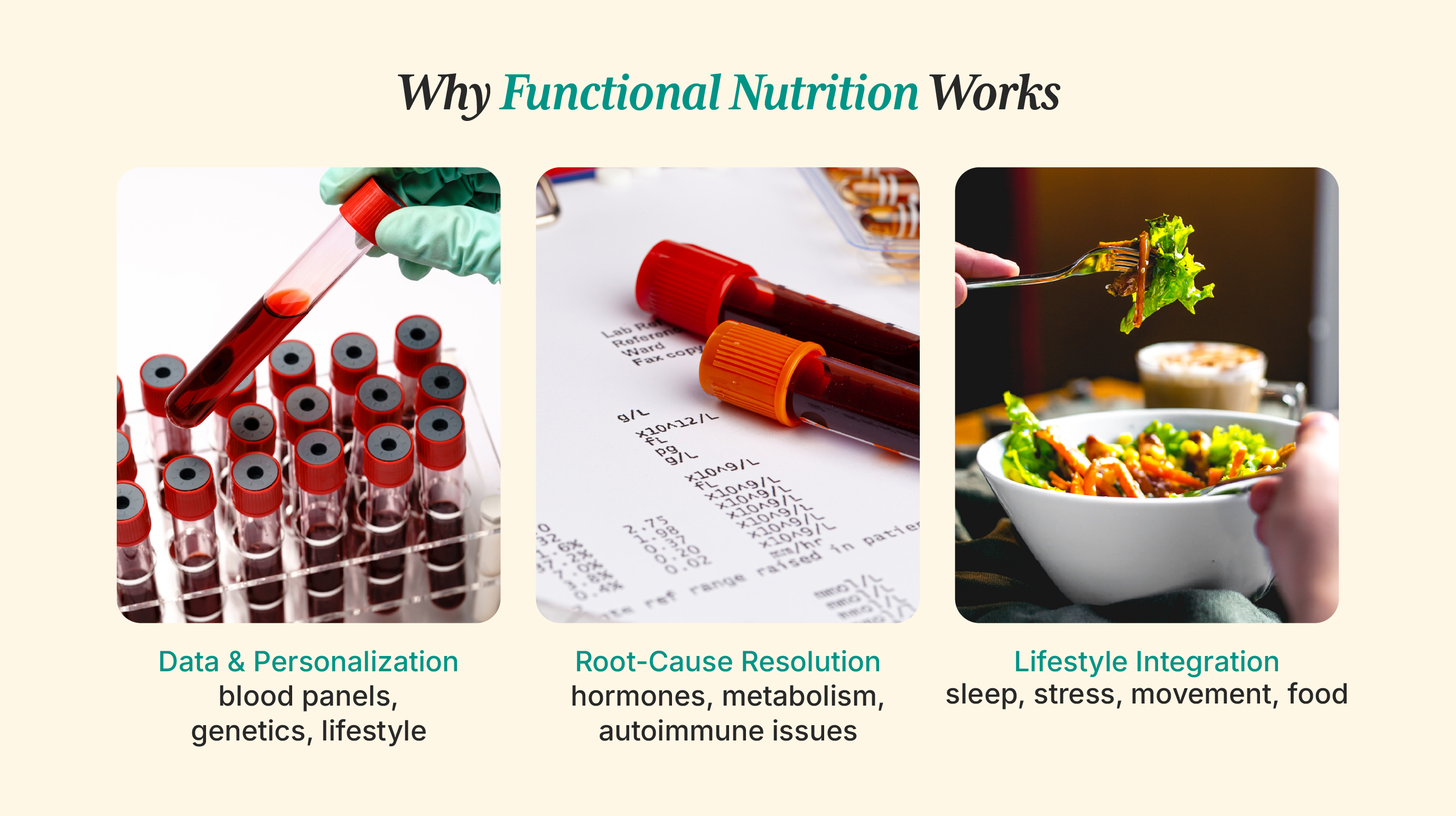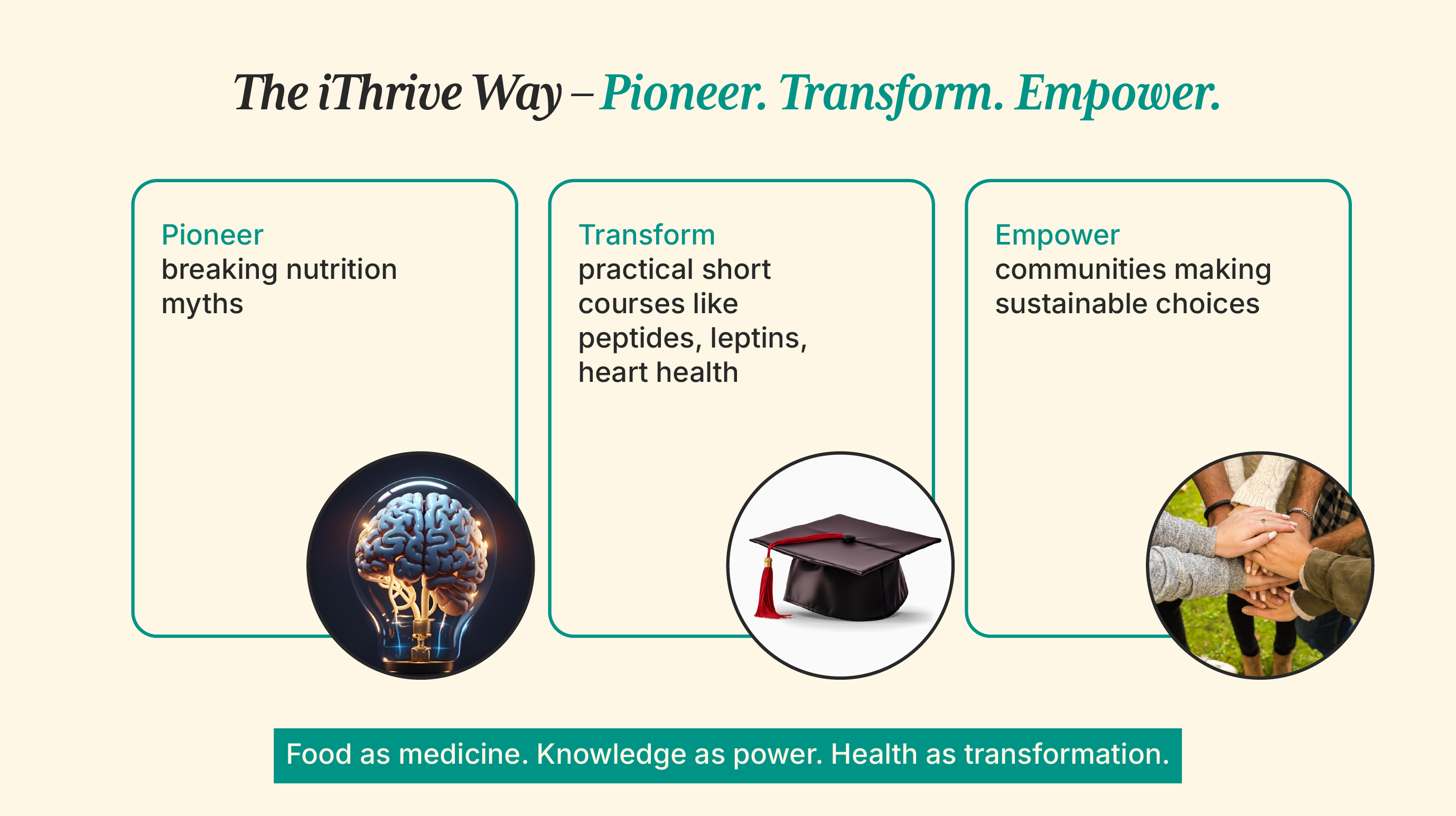Introduction
Scrolling through social media, it’s very easy to feel overwhelmed. One influencer swears by Keto, while another keeps praising Paleo, and somewhere in the corner, you see Functional Nutrition being hailed as the future of health. But the truth is, long-term lifestyle health is not about following trends, but about understanding your body, its metabolism, and unique nutritional needs.
This is exactly where Functional Nutrition comes into the picture. Unlike other restrictive diets, it potentially blends modern science with a holistic perspective, showing how lifestyle, food, and metabolism intersect. And for the learners exploring iThrive Academy’s courses, it’s an approach that goes far beyond the theory, further integrating courses such as iThrive Certified Functional Nutrition, heart health, women’s hormonal health, and many more make health transformation sustainable and practical.
Keto Diet: The most powerful tool with caveats
The Ketogenic also known as keto diet is a high-fat, low-carb regimen (roughly around 55 - 60% fat and 5 - 10% carbs) tailored to force the body into a state of ketosis, wherein fat becomes a significant source of energy. Its benefits can be quite impressive in the short term:
• Rapid fat burning and weight loss
• Improved glucose metabolism and insulin sensitivity
• Support for neurological conditions like epilepsy or Alzheimer’s
• Management of PCOS symptoms through reduced hyperinsulinemia and weight loss
Despite these advantages, Keto comes with long-term risks. Extended adherence can cause hormonal stress, thyroid suppression, insulin resistance, nutrient deficiencies, kidney stones, and elevated cortisol levels. While it might prove to be a great starting point for metabolic reset, the majority of experts agree that sustainability is quite a challenge, and Keto alone rarely supports long-term healthy eating or lifestyle health nutrition.

Paleo Diet: An Anti-Inflammatory Framework
The Paleo diet is quite inspired by the eating habits and patterns of our Paleolithic ancestors, focusing on nuts, fishes, lean meats, veggies, and fruits while also eliminating processed foods, dairy, and gluten. Its benefits includes:
- Reversal of Type 2 Diabetes and Obesity in early studies
- Anti-inflammatory effects, specifically in modified protocols such as Wahls Protocol 1
- Cognitive and mood improvements for individuals with autoimmune conditions
However, Paleo is surely not without limitations. Strict elimination of dairy and grains can result in deficiencies in Vitamin B1, B6, Vitamin D, Calcium, and Folic acid. Certain advanced incorporations, like Paleo Plus combined with principles of Ketogenic or intermittent fasting, can amplify therapeutic effects but also carry immense risk of metabolic and hormonal factors.
Functional Nutrition: A Sustainable, Personalized Approach
Unlike Paleo or Keto, Functional Nutrition is not a prescriptive diet , it’s rather a holistic, personalized strategy for lifelong health. Functional Nutrition integrates factors such as advanced testing, dietary insights, and lifestyle interventions to address root causes rather than the symptoms.
Why Functional Nutrition Works for Long-Term Health
1. Data-driven and Personalized
Generic dietary advice mostly fails as each individual’s hormones, metabolism, and genetics are quite unique. Functional Nutrition recognises these factors via tools such as blood panels, genetic testing, and even lifestyle assessments. This personalized approach further ensures that lifestyle interventions, nutritional choices, and supplement guidance are tailored to the individual, supporting long-term sustainable health.
2. Root-Cause Resolution
Instead of asking, “How can I lose weight?” Functional Nutrition asks, “Why is my hormonal balance or metabolism disrupted in the very first place?” This strategy permits for interventions that are preventive as well as corrective, addressing concerns such as leptin resistance, PCOS, or autoimmune conditions sustainably.
3. Lifestyle Integration
Functional Nutrition identifies that nutrition alone is never enough. Stress management, environmental factors, sleep, and movement are all considered to develop a complete health plan. For instance, leptin resistance cannot be completely addressed by diet, it also needs optimising sleep, balancing macronutrients, and managing cortisol.
Functional Nutrition in the Indian Context
In India, where dietary patterns, genetic predispositions, and environmental factors vary widely, Functional Nutrition Diet India provides a blueprint for long-term healthy eating that fits local lifestyles. Practitioners and learners can explore targeted short courses and iCFN to understand how nutrition interacts with lifestyle and metabolism.
Through the help of these courses, Functional Nutrition moves far beyond theory, showcasing how supplements, adjustments in lifestyle, and food choices can practically transform daily habits.
For example:
• Learning about micronutrients, antioxidants, and whole foods helps manage blood sugar and inflammation.
• Understanding gut health and hormonal balance allows learners to implement changes that are both effective and sustainable.
Incorporating these key insights empowers individuals to take entire control of their health in ways that Paleo and Keto alone can’t.

Keto vs Paleo vs Functional Nutrition: The Verdict
While comparing pros and cons of Keto diet, Paleo diet pros and cons, and the functional medicine diet approach, a specific pattern emerges:
- Short-term therapeutic benefits: Paleo and Keto, when done right, may offer a structured nutrition framework that is beneficial for metabolic reset, autoimmune support, and weight management.
- Sustainability complexities: Strict carb restrictions or elimination diet can result in nutrient deficiencies, difficulty in maintaining long-term adherence, and hormonal stress.
- Functional Nutrition: Offers a personalized, data-driven, and holistic path. It addresses root causes, supports long-term health, integrates lifestyle factors, and also gives sustainable health outcomes.
In short, Functional Nutrition is not at all about following trends, it’s about developing a lifestyle blueprint that incorporates your genes, environment, and metabolism. Diets have to be highly bioindividualised and people must not go for fads and trends. It pioneers a modern approach, transforming knowledge into everyday habits, and also empowers individuals to make lasting decisions for health. For instance, some might benefit from keto, but some might not.
Bringing Functional Nutrition to Life with iThrive
iThrive Academy offers learners practical pathways to implement Functional Nutrition:
- iCFN (iThrive Certified Functional Nutrition): Gain a structured understanding of functional foods, personalised nutrition, and metabolic optimization.
- Short Courses: Explore targeted areas such as peptides, women’s hormonal health, and leptin. These specific courses transform theoretical knowledge into actionable strategies.
- Lifestyle intervention: iThrive conveys that food is not just sustenance, it’s also a potential tool for overall transformation, further helping the learners embed principles of functional nutrition into everyday routines.
By participating in these programs, learners do not just learn what to eat, but they also understand why specific foods and lifestyle habits work together, how to navigate hormonal and metabolic complexities, and how to maintain long-term healthy eating.
At iThrive Academy, our vision has always been bigger than just teaching nutrition, it’s about creating a ripple effect of change. We pioneer by challenging outdated myths and blending traditional wisdom with modern science, helping learners see food as medicine rather than just calories. We transform by turning knowledge into action through practical, hands-on courses, so that students can apply what they learn in real life. And most importantly, we empower communities by equipping them with the tools to make conscious, healing choices every day. Because when you understand food at its core, you don’t just change your plate, you rather change your life, and inspire others to do the same.
Final Thoughts

Keto and Paleo can be very useful for specific goals or short-term therapeutic purposes, but they rarely address the complex web of factors further influencing long-term health. Functional Nutrition, on the other hand, is tailored for the long game.
• It adapts to your unique needs
• It addresses root causes, not just symptoms
• It integrates diet with lifestyle, genetics, and environment
• It empowers sustainable, evidence-based choices
For anyone asking, “What’s the best diet for long-term health?,” the answer is not a trendy plan, it's a functional, personalized approach that supports lifelong wellness. Through the help of iThrive academy’s short courses and iCFN, this approach becomes measurable, actionable and most importantly sustainable.
In a world full of fads, Functional Nutrition is a way to reclaim your health, understand your body, and transform your lifestyle permanently, making it the clear winner for anyone serious about long-term lifestyle health.












.jpg)









